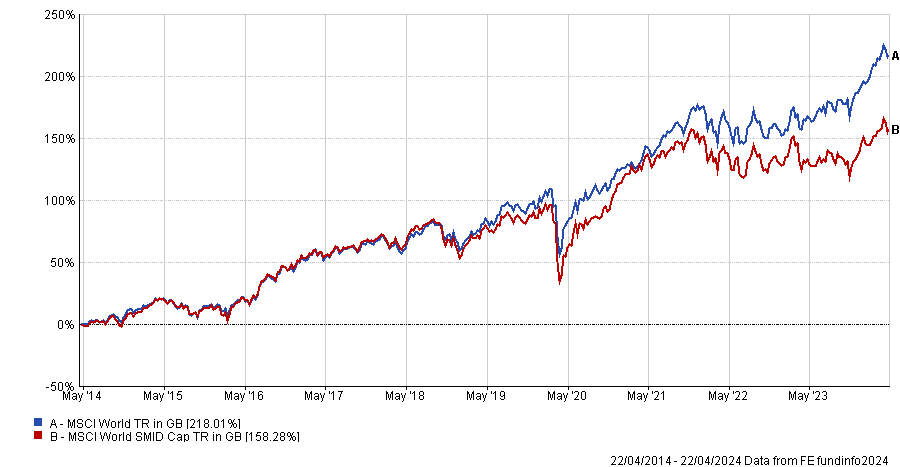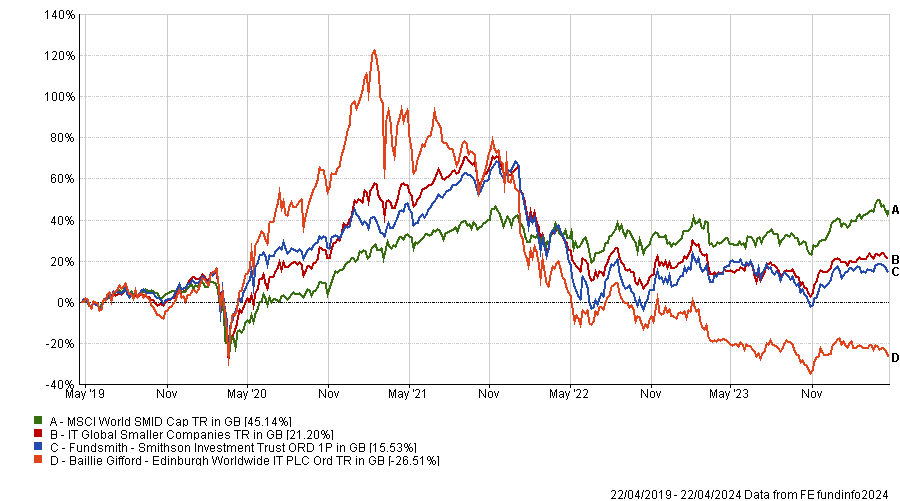Fundsmith Equity and Scottish Mortgage rank high on investors’ buy lists due to their impressive performance over the past decade.
As a result, fans of the two global large-cap portfolios might also be interested in their small-cap siblings, Smithson and Edinburgh Worldwide.
In theory, small-caps should outperform larger businesses over the long term, although that hasn’t worked out in practice over the past 10 years.
Jason Hollands, managing director at Bestinvest, said: “The past few years have been relatively tough for smaller companies given the disruption of the pandemic, which has been followed by the headwinds of rampant inflation and rising borrowing costs. Small-caps have also been overshadowed by the dominance of US mega-cap growth stocks.”
Performance of indices over 10yrs

Source: FE Analytics
However, with inflation and interest rates past their peaks, now could be a good time to reconsider small-caps. A lower rate environment should boost investors’ appetite for riskier assets, reduce borrowing costs and improve access to capital, all of which bode well for smaller companies.
Below, experts compare Smithson and Edinburgh Worldwide, explain which one they would choose and look at other options in the IT Global Smaller Companies sector.
Two different investment philosophies
Although both Smithson and Edinburgh Worldwide belong to the same sector and share a bias to growth stocks, their investment strategies have little in common.
Smithson follows a quality growth strategy, underpinned by Fundsmith’s mantra: “Buy good companies, don’t overpay, do nothing”.
Key characteristics that the trust’s managers Simon Barnard and Will Morgan look for are high returns on invested capital, high cash conversion and healthy profit margins.
By comparison, Edinburgh Worldwide has a greater focus on earlier stage, faster growth companies and holds a significant proportion in private companies, whereas Smithson has none.
In summary, Smithson favours sustainable growth, whereas Edinburgh Worldwide is more of a high risk, high reward strategy.
Smithson is not a pure small-cap strategy as it includes mid-cap stocks, whereas Edinburgh Worldwide typically holds companies with a market capitalisation of less than $5bn when the investment is made.
Matthew Read, senior analyst at QuotedData, noted that Edinburgh Worldwide is the “most small-cap focused by some margin” in the IT Global Smaller Companies sector, whereas Smithson stands at the opposite end of the spectrum, with the strongest bias to mid-caps.
Another reason why Smithson hunts for opportunities higher up in the market cap spectrum is due to its larger size. Despite being the youngest of the two investment trusts, it has a market value of £2.1bn, while Edinburgh Worldwide has £528m.
“Smithson had a very successful IPO and, through a combination of decent performance and further issuance, it is now the largest fund in the IT Global Smaller Companies sector by some margin,” Read observed.
“Although its closed-end structure allows it to hold the same kind of stocks as Edinburgh Worldwide, for these to make a meaningful impact, Smithson needs to hold much bigger positions and it is easier when trading in less liquid stocks to move the market against yourself.
“It therefore makes sense that Smithson holds larger stocks, but it may miss out on some opportunities as a result.”
Read also noted that Smithson is the most expensive of the two funds, in spite of its larger size, which should be conducive to economies of scale. As of 23 April 2024, Smithson had an ongoing charge figure of 0.9% versus 0.7% for Edinburgh Worldwide.
Another difference is that the small-cap declination of Fundsmith Equity is not geared, whereas Edinburgh Worldwide has a net gearing of 14.8%. This may explain why the Baillie Gifford trust has been more volatile over the past five years.
In terms of performance, both have lagged the MSCI World SMID Cap index over the same period, but while Smithson is still in positive territory from an absolute return perspective, Edinburgh Worldwide is down 26.5%.
Performance of investment trusts over 5yrs vs sector and benchmark

Source: FE Analytics
Which one should you pick?
Due to their distinctly different philosophies, each trust will cater to the needs of different investors.
Hollands said: “Edinburgh Worldwide is more of a ‘punt’ with potential significant upside if the likes of SpaceX IPO at some point, whereas Smithson offers access to a portfolio of high-quality companies that can compound returns over time and would therefore be a more core play in the global small and mid-cap space.
“Which one to invest in therefore depends what type of investor you are, but for me it would be Smithson of the two.”
James Yardley, senior research analyst at Chelsea Financial Services, also prefers Smithson, which his firm uses in the VT Chelsea Managed Aggressive Growth and VT Chelsea Managed Balanced Growth funds.
“Smithson has much better diversification across different sectors and has still delivered a good share price return of over 40% since its IPO, despite a severe headwind to its style in recent years,” Yardley said.
“The trust has had a tough time recently but we think the shares offer very good value at a 10% discount. We believe Simon Barnard and Will Morgan are strong managers and have a good process.”
While he deems Edinburgh Worldwide to be an “interesting” trust, he stressed that it comes with a high degree of risk, with severe drawdowns when things don’t play in its favour. Furthermore, it is heavily exposed to healthcare, biotech and software.
However, Quoteddata’s Read prefers Edinburgh Worldwide as he believes it has greater long-term potential due to its exposure to artificial intelligence (AI).
“The market embraced the potential of generative AI last year and this has continued year-to-date and looks like it could be a structural trend for some time,” he noted.
“Edinburgh Worldwide has a significant focus on areas such as technology and healthcare and should be well positioned to benefit as the market’s focus widens beyond the initial large-cap beneficiaries. Smithson should benefit as well but perhaps to a lesser extent.”
Another option for small-cap exposure
Read proposed The Global Smaller Companies Trust as a more neutral option for conservative investors.
The small-cap version of F&C Investment Trust, it does not have any particular investment style or sector bias. It has a broader portfolio and a modest level of gearing, which has historically ensured more stable returns, while offering a small yield of 1.6%.
Read concluded: “The Global Smaller Companies Trust is arguably the safe bet within the global smaller companies space (it has one of the lowest NAV volatilities) but seems less well exposed to the technology-related trends that look like they might be driving markets for some time.”




